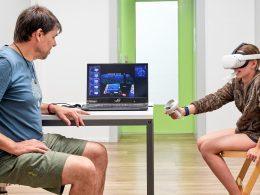Researchers at the University of Basel have developed a virtual reality app for smartphones to reduce fear of heights. They demonstrated its effectiveness in a study. Test subjects who trained with the app were then able to cope better with a real altitude situation.
Around five per cent of the population suffers from a fear of heights. However, those affected rarely take advantage of treatment options such as exposure therapy, in which they place themselves in the feared situation under professional guidance. Those affected are reluctant to expose themselves to their fear of heights, and difficulties in creating suitable height situations in a therapeutic setting also play a role.
An interdisciplinary research team from the University of Basel has therefore developed "Easyheights" - a virtual reality app that can be used to simulate an exposure on a smartphone. The app works with 360° images of real locations, which the researchers took with a drone.
Those affected can use the app on their smartphone. In the virtual experience, the user stands on a platform that is initially one metre above the ground. After a period of familiarisation, the platform is automatically raised further. In this way, the perceived position above the ground increases slowly but steadily without the fear increasing.
Test subjects with four hours of altitude training
50 study participants with a fear of heights either completed a total of four hours of altitude training - once for 60 minutes and six times for 30 minutes within two weeks - in virtual reality or were assigned to the control group without such training. Before and after the training phase, the test subjects climbed the Uetliberg observation tower near Zurich as far as their fear of heights would allow. The researchers recorded the height they reached and the level of fear they felt on each floor of the observation tower. Ultimately, the researchers were able to analyse the results of 22 test subjects with "Easyheights" training and 25 from the control group.
The group that had trained with the app showed less anxiety on the tower and was able to climb higher towards the top than before the training, according to the report. There was no positive change in the control group. The effectiveness of height training with "Easyheights" proved to be comparable to that of classic exposure therapy, writes the University of Basel.
Therapy in the living room at home
The study results suggest that the repeated use of virtual exposure therapy on a smartphone can significantly improve behaviour and subjective well-being in altitude situations. People with mild forms of fear of heights will soon be able to download the free app from popular app stores and practise on their own. However, the researchers recommend that people with a pronounced fear of heights only use the app when accompanied by a specialist.
Source: Unibasel









